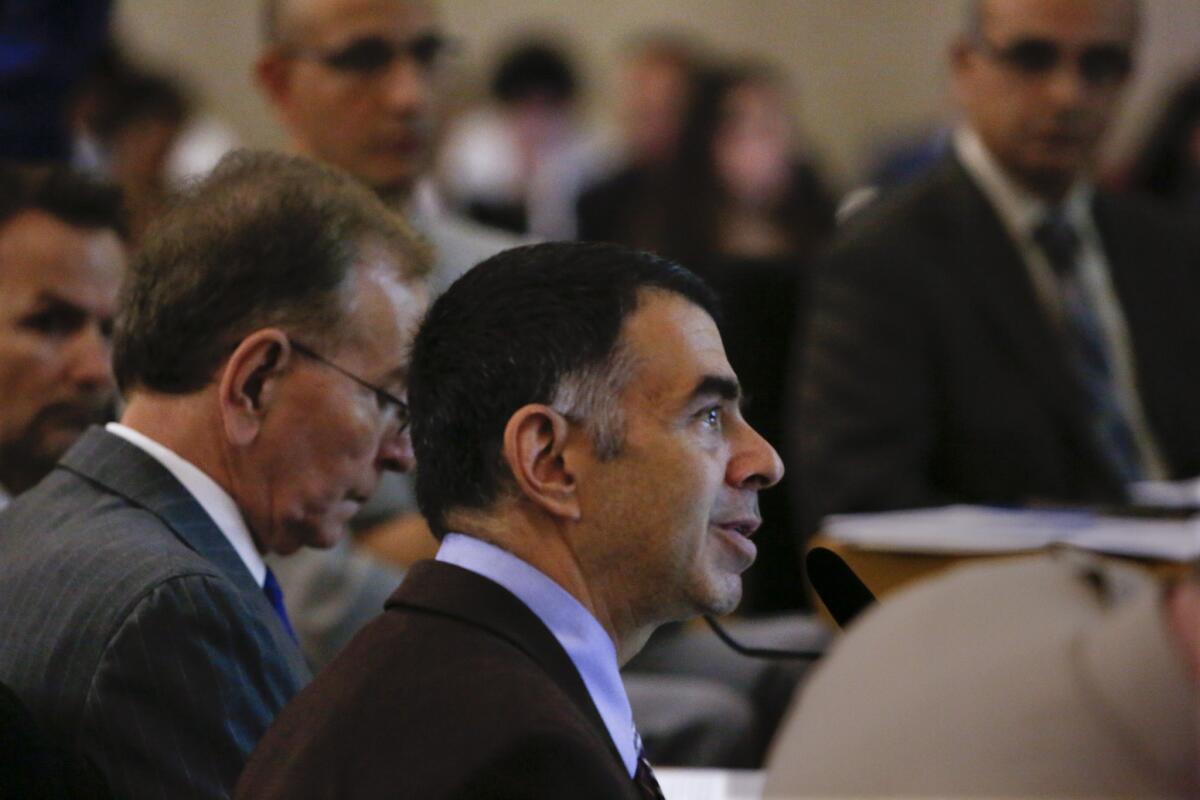L.A. County supervisors move to consolidate three health agencies

Dr. Mitch Katz, Director of the Department of Health Services speaks at an Los Angeles County Board of Supervisors meeting in June. Katz is a proponent of consolidating the county’s three health agencies.
Los Angeles County supervisors voted Tuesday to consolidate three sprawling health agencies under a single director.
The action caused some advocates to fear that the change would favor county hospitals at the expense of agencies providing mental health and public health services.
Proponents of the new structure include many county psychiatrists and physicians and Health Services Director Mitchell H. Katz, who will probably be tapped to lead the organization. Supporters say a unified agency will save money on administrative costs and better coordinate services to people who may have a combination of physical, mental health and substance abuse issues.
Supervisor Michael D. Antonovich said it would “improve access, health outcomes and system efficiency.”
“In the present and expected future healthcare environment, and to best meet the needs of our constituents, the county must move from fragmentation to integration of its healthcare delivery system,” he wrote in proposing the change.
The departments of health services, public health and mental health were all one agency in 1972, but the mental health department was spun off in 1978 following complaints that money intended for mental health services was being diverted to hospitals. In 2006, public health was separated from health services, in part because of major budget deficits in the hospital system that led to cuts in public health programs.
Backers of the current consolidation say those issues will not resurface because each agency will retain its own budget.
“A lot has changed since 2007,” Katz told the supervisors. “At that time, DHS was in crisis, with huge deficits this board had to deal with that threatened the entire county. We’re now in a position where the county is healthy.... There is no deficit, we’re not proposing meshing the budgets.”
Opponents of the consolidation -- dozens of whom spoke Tuesday -- fear a repeat of those days.
Some, like Guyton Colantuono, executive director of Project Return Peer Support Network, a program run by people with mental illness, also voiced concerns that the new agency will focus on drug-based medical treatment of mental health issues at the expense of working on developing social support systems and teaching coping mechanisms.
“That is a frightening possibility,” he said. “We as mental health consumers will continue to fight as long as it takes to reject becoming second-class citizens again.”
Directors of the public health and mental health departments also expressed reservations.
Interim public health director Cynthia Harding pointed out that many of her department’s programs -- such as restaurant inspections, disease outbreak investigations and sexually transmitted disease prevention -- deal with the health of the general public rather than clinical care.
“There’s the concern that our time and energy will be taken for focusing on a small group of clients rather than the entire county,” she said.
Supervisors sought to allay those fears, saying that the medical system will not subsume mental health and public health priorities.
The vote was 4-0, with Supervisor Don Knabe abstaining. Knabe said he was not comfortable voting before seeing final details of the plan.
The final structure for the new agency will be worked out in a strategic plan to be developed by the directors of the three departments over the next 45 days. Among other priorities, the group will look at ways to improve information-sharing between departments, reduce overcrowding in hospitals’ emergency psychiatric wards and reduce homelessness among people with medical problems.
An advisory board made up of volunteers from various county health commissions, labor unions, and patients of each of the departments, will help to guide the process.
Follow Abby Sewell on Twitter at @sewella for more county news.
More to Read
Sign up for Essential California
The most important California stories and recommendations in your inbox every morning.
You may occasionally receive promotional content from the Los Angeles Times.











